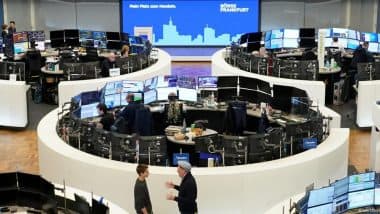Global markets from Europe to Asia have continued to feel the pain of Donald Trump's tariffs. The US president has shown no sign of reconsidering despite the economic turmoil. DW has the latest.
Germany's DAX index falls nearly 10% at opening on MondayAlso Read | Fuel Price Hike: Congress Lashes Out at BJP-Led NDA Government Over Excise Duty Hike on Petrol and Diesel, Says 'Rubbing Salt Into Wound of People'.
Key stock markets in Asia have continued to fall
US stock markets are also expecting further losses on MondayAlso Read | Mehbooba Mufti Accuses Omar Abdullah of Yielding to BJP's 'Anti-Muslim' Agenda, Says 'Ashamed That Muslim CM Did Not Raise Voice for Community on Waqf Act'.
EU trade ministers are meeting to discuss how to respond to Trump's 20% tariffs
US President Donald Trump has shown no signs of backing down, calling the global market turmoil a necessary 'medicine'
Here are the latest developments from the fallout of the Trump tariffs on Monday, April 7:
EU trade chief calls for 'paradigm shift' in international trade
The European Union's trade chief has said that Monday's meeting will focus on the "paradigm shift" in international trade.
"What we are going to discuss is how to position Europe in what I would describe as the paradigm shift of the global trading system," Maros Sefcovic told reporters before meeting with the bloc's 27 trade ministers.
Ahead of the 20% tariffs against the EU coming into effect on Wednesday, Sefcovic said "our next move in relation vis-a-vis the United States but also how to prepare our trading system back in the European Union to prevent eventual trade diversion."
There have been calls for a united position, but splits have already emerged with France and Germany pushing for the use of the so-called "trade bazooka," a relatively recent option that would allow the EU to aggressively target US sectors.
But Ireland, reliant on US investment, has come out against using the "anti-coercion instrument," as it is officially known, with Irish Trade Minister Simon Harris calling it the "nuclear option."
What can Europe do to respond to Trump's tariffs?
Trump said he would slap 20% tariffs on European Union goods, to which the bloc has promised countermeasures if negotiations with Washington fail.
The United States and the EU have the world's largest commercial relationship, trading some €1.6 trillion ($1.7 trillion) in goods and services in 2023.
Trump frequently hits out at the EU over the balance, given the higher volume of European goods sold in the US compared to vice versa.
US goods imports into the EU totaled €334 billion in 2024, against €532 billion of EU exports to the US, according to EU statistics agency Eurostat.
However, the overall balance of trade is roughly even.
While Europe exports more goods to the US than it imports in the opposite direction, that situation is reversed when looking at services.
That means the service sector, particularly tech, could be the main avenue through which Brussels could hit back.
Economists say that Europe could widen the trade war, in particular by targeting Big Tech — a category more vulnerable to retaliation because of the US surplus.
Brussels could hit back with a tax targeting US tech titans like Google, Apple, Meta, Amazon, and Microsoft — a move French officials have pushed for.
At the same time, the EU’s powerful new Anti-Coercion Instrument (ACI), in force since late 2023, gives the bloc sweeping authority to strike back at foreign countries trying to strong-arm its members into policy changes.
German Economy Minister Robert Habeck says Europe should be prepared to use the new instrument, described as a trade "bazooka," in any transatlantic trade war.
The EU can also limit access to public procurement tenders for companies from a third country or take action when it comes to the services trade or investment.
Europe's strategy on goods so far has been to limit retaliation to early tariff rounds to just a few politically sensitive goods, rather than escalate an all-out trade war.
When Trump hit steel and aluminum imports with a 25% tariff in March, Brussels opted for "an eye for an eye" approach.
With Trump's extra levies, Brussels opted to target US goods from mid-April, including Harley Davidson motorbikes and agricultural products.
Officials have previously said the EU will target goods from politically important US states, including soybeans produced in Louisiana.
Ireland says EU tech tariffs would be an 'extraordinary escalation'
EU member state Ireland has expressed concern over the possibility that the EU may respond to Trump's tariffs with measures against the US tech industry.
Irish Trade Minister Simon Harris said: "It would be an extraordinary escalation at a time when we must be working for de-escalation."
Ireland is home to several major US tech companies that take advantage of its low tax rates and access to the European market.
As such, any impact on the tech industry could take a heavy toll on the Irish economy.
German economy minister says Europe is in a position of strength
German Economy Minister Robert Habeck has called for a unified European response to the Trump tariffs ahead of a meeting with other EU ministers in Luxembourg.
"The damage can get even worse," warned Habeck, who will remain in his role in a caretaker capacity until the next coalition government is formed.
The minister said the EU must respond "calmly, prudently but also clearly and with determination."
That means "being clear that we are in a strong position — America is in a position of weakness."
He went on to say that, unlike the US, the EU does not have any "time pressure" now.
The German economy minister also said Monday that the basis of calculations behind Trump's tariffs was "nonsense."
Assuming hat a trade surplus or deficit was a problem is "wrong," Habeck said. "In the end, globalization serves all economies," he said, adding that the US economy grew faster than European economies in the last 20 years.
Habeck also rejected a proposal by tech billionaire, and close Trump ally, Elon Musk that the EU and North America should form a free trade zone.
The German minister called it "ridiculous," especially in light of Trump's tariffs.
"I think that's a sign of weakness and maybe of fear," Habeck said.
Merz says coalition talks must focus on German response to tariffs — report
Germany's likely next chancellor Friedrich Merz has called for a swift reaction to Trump's tariffs, telling Reuters news agency in an emailed statement that the situation for global markets would likely get worse.
"The situation on the international equity and bond markets is dramatic and threatens to deteriorate further," Merz told the news agency. "It is therefore more urgent than ever for Germany to restore its international competitiveness as quickly as possible."
"This issue must now be at the center of the coalition negotiations," he added, in reference to the ongoing talks between his center-right coalition and the center-left Social Democrats.
Merz has called for tax cuts, reducing red tape and lowering energy prices.
But even before coalition talks started, he helped push through a historic spending package that included a major reform to Germany's so-called "debt brake."
Germany, along with the rest of the EU, is facing 20% tariffs on most of its exports to the US from Wednesday. As a major export, Germany is particularly vulnerable to tariffs, portending further trouble for the already stuttering German economy.
Hong Kong stock market closes with biggest fall since 1997
The Hong Kong stock exchange closed on Monday with a 13.22% drop, its worst one-day tumble since the 1997 Asian financial crisis.
China has been hit with some of the highest tariff rates following Donald Trump's "Liberation Day" announcement last week. He added a 34% "reciprocal" tariff on top of the 20% tariff previously announced.
In response, China has said it will impose its own 34% tariff against US goods, starting from April 10.
Germany's leading DAX index leads in European losses on Monday
The German DAX index dropped by nearly 10% on Monday morning as stock markets opened, before recovering slightly to hover around 7% in the red as trading continued.
The tumble follows days of volatility in global markets sparked by Trump's tariffs.
A 20% tariff against most EU imports to the US is set to come into effect on Wednesday.
Indexes in other European countries were also in freefall on Monday morning.
Paris saw a more than 6% drop, while in London it was just under 6%. Losses of more than 5% were seen in Amsterdam and Oslo, while Italy's Milan stock exchange saw losses of over 3%.
Trump tariffs — what you need to know
On April 2, US President Donald Trump announced a raft of new tariffs against friends and foes alike.
These included a baseline of a 10% levy on almost all imports into the US as well as custom "reciprocal" tariffs on countries that Trump considers to have been pursuing unfair trade policies with the US.
This includes 20% tariffs against the EU and a 34% tariff on Chinese products (on top of a 20% tariff that he previously announced), among others. The highest tariff of 50% was placed on the small southern African country of Lesotho.
On the list of countries exempt from tariffs are Russia and Belarus, but not Ukraine.
The baseline 10% tariffs came into effect on Saturday (April 5), with the custom tariffs set to start on Wednesday (April 9), leaving little time for affected countries to respond.
The tariffs have already sent stock markets tumbling around the world, with some seeing their worst losses since the global Covid pandemic.
Some countries have sought negotiations with the Trump administration to bring the tariffs down. On Sunday, US Treasury Secretary Scott Bessent said that more than 50 countries had started talks.
However, other countries are retaliating in kind. China, the world's second-biggest economy, announced its own reciprocal measures last week, matching the US' 34% tariffs.
While the high rates against China have been taking their toll on Chinese markets, Beijing is hoping that the turmoil will ultimately leave it as the more reliable option for investment and trade.
Indeed most economists agree that the tariffs will have a negative impact on the US economy, sending up prices and unemployment and likely triggering a recession.
Nevertheless, Trump has shown that he is willing to accept the damage done, and the widespread unpopularity, calling the shock measures a necessary "medicine" to fix what he sees as an unfair trade imbalance.
"They are coming to the table. They want to talk but there's no talk unless they pay us a lot of money on a yearly basis," Trump said on Sunday. Economists have pointed out that this is not how global trade normally functions.
India remains confident of growth forecast despite tariff toll
Stocks tumbled in India as trading opened on Monday morning, with the benchmark "Nifty" index down by more than 3.5%.
India's key IT sector, whose single biggest market is the US, was down by more than 5.5%.
Nevertheless, the Indian government said it was confident that it could still hit its 6.5-6.8% projected growth for the financial year that started at the beginning of April.
Delhi pointed to the low cost of oil even as private economists were less optimistic. Goldman Sachs lowered its growth forecast for India to 6.1%.
Indian officials have expressed concern over the impact of tariffs on labor-intensive sectors such as agriculture, textiles and footwear.
However, the country's major pharmaceutical industry, which exported more than $8 billion (€7.3 billion) worth of goods to the US in 2024, has been exempt from the tariffs due to the US' reliance on imported medicine.
Tariff fears send markets into freefall across Asia
Stocks across Asia went into freefall due to fears over a global trade war in the wake of China retaliating against Donald Trump's sweeping tariffs.
Singapore's Straits Times Index plunged 7.37%. The Taiex, the weighted index of the Taiwan Stock Exchange, plunged 9.8% at the open as trading resumed after a long weekend.
In Hong Kong, the Hang Seng Index fell 9.3%, while in mainland China, the Shanghai Composite Index lost 4.4%.
In India, the "The Nifty 50" comprising the largest Indian companies on the national stock exchange, fell more than 3.5% at the open on Monday.
China, now facing US tariffs of more than 50%, retaliated in kind on Friday by imposing additional levies on US imports.
Japan's Nikkei index plunges further on Trump tariff concerns
Japan's Nikkei stock index plunged further on Monday, as US futures pointed to more losses on Wall Street over President Donald Trump's sweeping tariffs.
In early trade in Tokyo, the Nikkei 225 was down 8.15%, adding to a 2.75% drop on Friday, while in Seoul, the Kospi was down 4.8%.
Meanwhile, Japanese Prime Minister Shigeru Ishiba said the government will continue to ask Trump to lower tariffs on Japan, but acknowledged that results "won't come overnight."
Welcome to our coverage
Global markets continued to reel on Monday from US President Donald Trump's tariff announcements last week.
Trump, who said "tariffs" was one of his favorite words, has appeared prepared to stick to his policy of blanket tariffs, despite the massive amount of value that has already been wiped from stock markets around the world.
The response from countries hit by the tariffs has included both retaliatory actions and attempts to find an agreement with the White House.
EU trade ministers are set to meet on Monday to figure out what their unified response to the tariffs should be.
(The above story first appeared on LatestLY on Apr 07, 2025 04:50 PM IST. For more news and updates on politics, world, sports, entertainment and lifestyle, log on to our website latestly.com).













 Quickly
Quickly






















